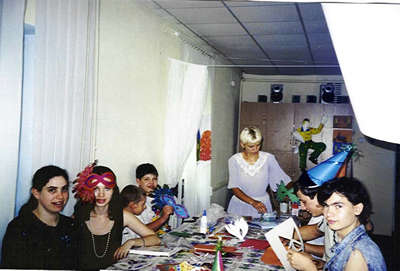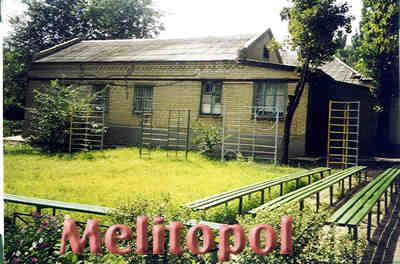|
Jewish Renaissance in Melitopol
By Eliyahu Kramer
Nestled between green mountains and pastoral streams, the city of Melitopol, a former country vacation spot, known for its peaceful nature and proximity to the Black Sea, has become a growing source of Jewish revival. During World War II, Melitopol was in the part of the Ukraine that fought vigorously against the Nazi invasion.
Prior to World War II, there was a very active Jewish Community there. However with the Nazi forces advancing, many people were killed. Those Jews, who remained after the Nazi defeat, were oppressed by the Communist take over after the war. The Communists closed one synagogue and destroyed the other one. Jewish consciousness was suppressed and subsequently the local Jews intermarried as occurred in the rest of the former Soviet Union.
Such was the scene in Melitopol when the Soviet Union broke up in 1990. At that time the Jewish community struggled to rebuild itself. The new Ukraine government returned to the Jewish community several of the various buildings that were confiscated by the Communists. However, the buildings represented only a material gain, lacking now was a spiritual dimension. The Jewish community required a dynamic spiritual leader to activate the latent Jewish feelings of its Jewish inhabitants.
Eliyahu Kramer, a young newly wed and newly ordained Rabbi from New York with his Israeli wife, decided that Melitopol was the challenge that they were looking for. Neither the young Rabbi nor his wife knew any Russian, yet the local Jewish population greeted them with open hearts. Language is no barrier between people when Jewish hearts are concerned, and so the Rabbi and his wife quickly developed a warm rapport with the Jewish community.
First the ancient synagogue was reopened and began functioning not only as a place of prayer, but also as an active service center providing material help for the impoverished Jewish citizens. On Passover, as an example, the Kramer's hosted a communal Seder for over one hundred people and as guest of honor, the mayor, a non-Jew, came to witness this impressive revival of Jewish consciousness.
A kosher soup kitchen was initiated to provide for the material benefit of the local Jewish community. The people there are extremely poor, they make very little money and the free meals are a great boost to their material welfare. Lessons in the various aspects of Judaism were begun, and the Rabbi and his wife became occupied with quenching the thirst of these seekers of Jewish traditions and custom, such as Sabbath and Festival observance, mezuzahs, Chanukah lighting, prayer, etc.

Preparing for Purim
The ancient custom of tzedaka [Charity] was brought back. At first the Rabbi was hesitant to cause his impoverished congregation to put a few coins in the tzedaka box each day, so he provided coins that they could place in the tzedaka box. To his great surprise, the local Jews refused to take money from him to fulfill the mitzvah of tzedaka, and proudly reached into their threadbare pockets and gave from their own money.
Financial help was given in the form of food parcels, meals, clothing, and money, plus help to provide needed medication. The local hospitals require prepayment as a condition to be admitted to a hospital. Many people are turned away because they do not have the means to pay for medical treatment. The Rabbi and his wife have saved several lives by paying for hospital admittance and medical supplies.
A Tzadik of the Ukraine, Doja Hava, a righteous gentile that saved Jewish lives during the Holocaust, came to the Rabbi asking for help to save his sick wife who needed medication for her heart. He was given full support from the Rabbi plus warm thanks for the kindness that he showed during the Nazi occupation when he risked his life to save Jews.
The Rabbi and his wife were anxious to set up a summer camp for the youngsters. It was difficult to ascertain who really was Jewish since inter-marriage is so common and knowledge of who is really a Jew is scarce, but the Rabbi checked marriage certificates, birth certificates and sometimes even death certificates to be certain that the children in his camp were really Jewish. (We must keep in mind, that since poverty is so prevalent, many people will conceal the truth in order to receive free meals.) The camp was run for close to a month and was thoroughly enjoyed by the children. The children learned with enthusiasm about Jewish life and traditions.
Many other activities were begun including bar and bat mitzvah parties with cheerful celebrations, and Brit milas with an expert mohel, accompanied by festive meals. Visiting Jews in neighboring villages in the area became a favorite pastime for the Rabbi and his wife, bringing Jewish spiritual cheer and knowledge to those living outside the metropolitan areas. A free nursery school was started with hopes to expand.

Party after Brit Milah
The Rabbi envisions starting the first Jewish school in Melitopol since the Holocaust. To realize this, he is embarking on a fund raising program. He needs close to one hundred thousand dollars a year to just to function; to open a new school will cost even more. But without the school, the young Jewish children will never be able to acquire the education they need to get out of their material and spiritual poverty.
You can help by sending a tax-deductible donation to:
Chabad
C/o Kramer
620 Montgomery Street,
Brooklyn, New York, 11225
~~~~~~~
from the November 2002 Edition of the Jewish Magazine
|











